CHILD HEADED HOUSEHOLDS PROGRAM





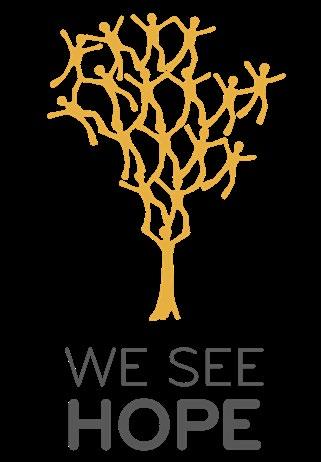 A MESSAGE FROM WESEEHOPE UK CEO
A MESSAGE FROM WESEEHOPE UK CEO

At WeSeeHope, it is vital that our work reaches children who need it most.
In the communities we work with across East Africa, these are children living without the support and care of a parent or guardian.
Each day, they face an unimaginable set of obstacles to living a healthy and fulfilling life. These children endure extremely poor and isolated living conditions, a severe lack of income to cover daily needs and food, limited access to education and mentorship, and are particularly at risk of abuse.
In 2018, we launched our Child Headed Households (CHH) Program to sustainably tackle the challenges of this vulnerable young population. We are proud to publish this Impact Report, the first to demonstrate the monumental progress that 225 households made up of over 800 children have achieved, particularly over the last year.
Working directly with the eldest child who is the head of the household, our aim is threefold:
1. To quickly boost the children’s standard of living and wellbeing.
2. To connect them with a trained guardian to help them integrate with their community and process their grief or trauma.
3. To kickstart a journey for the households to learn new skills and develop opportunities that will help them to thrive for many years to come.
It is this joint focus on supporting households both in the short-term and long-term that makes the program truly impactful.
Today, we run it in Malawi and Uganda with three of our incredible local partners.
Malawi and Uganda are ranked 169th and 166th respectively on the UNDP’s latest Human Development Report, making them two of the world’s least developed countries.
Whilst the total number of child headed households is unknown, 70% of the population in Malawi are estimated to live below the income poverty line of $2.15 a day, and maternal mortality and HIV and AIDS related death rates are amongst the highest in the world. As a result, it is estimated that 5% of children are orphans having lost one or both of their parents.
In Uganda, UNICEF estimates that there are around 1.7 million children who have been orphaned, with a significant proportion living in a child headed household.
Despite the program being relatively new, the results we have seen since 2018 have been extremely encouraging. The 75 households that have graduated from the program so far have more than quadrupled their annual income across three years from a starting point of nothing.
2022 was a standout year. For example, almost all of the households we work with in Malawi reported bumper harvests and grew enough food to last them for many more months with extra to sell when prices increase to yield the best profit.
We cannot thank enough all those who have played such a crucial role in the growth of the program in these last few years. Your incredible commitment to our work means that we can continue to support the most vulnerable children to develop opportunities that have a truly life changing impact.
Mark GlenYusuf, on the right of the picture, is 17 years old and lives in Kankhomba, Malawi, with his eight younger siblings and their grandmother. Since joining the program in 2022, Yusuf has already harvested 23 bags of maize and two bags of groundnuts through his food garden.
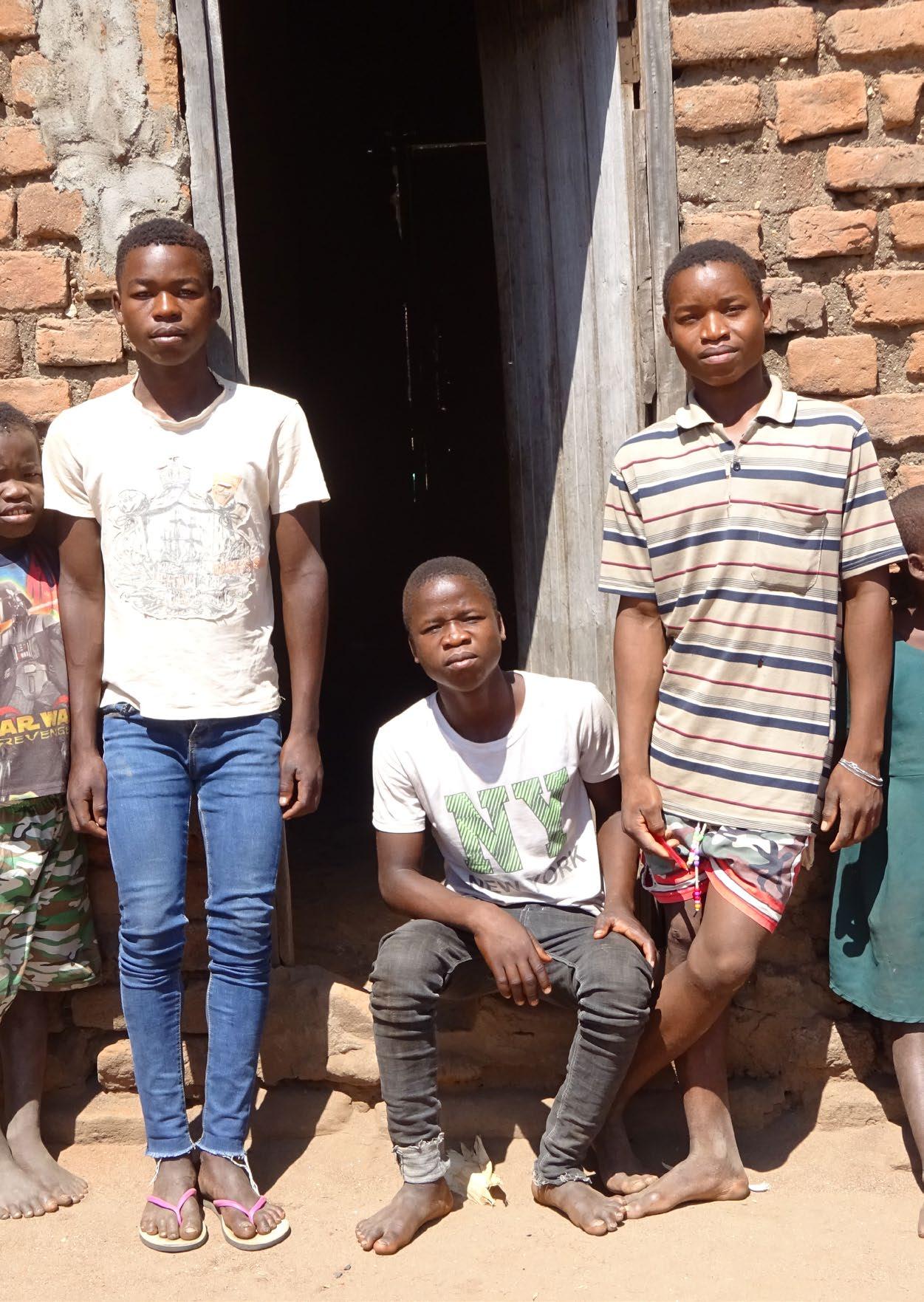
“We feel part of our community now. My siblings are smiling and I am happy.”
A child or group of children who have been orphaned, abandoned or left to care for an old or sick relative are extremely vulnerable.

With no safety net, it is a struggle for them to survive on a day-to-day basis.
They are at an acute risk of:
• Hunger and starvation
• Stigma, discrimination and isolation
• Lack of inheritance rights and poor housing
• Exploitation, abuse and child labour

• Lack of school materials and fees
No matter their age, the eldest child
bears the responsibility of being the sole provider, caregiver and protector of their household. Living alone or caring for younger siblings, this is an incredible burden to carry.
We seek to directly address the immediate and longer-term challenges that child headed households face. Over three years, we make a significant, longlasting and self-sustaining difference to their wellbeing and standard of living by:


IDENTIFYING & TRAINING community volunteers as guardians who are responsible for visiting the households regularly to provide guidance, counseling, protection and a helping hand in their homes.
the households with the tools and training to safely earn an immediate source of income through a small business, such as cooking equipment to sell baked goods or bicycles which they can use as a local taxi service.
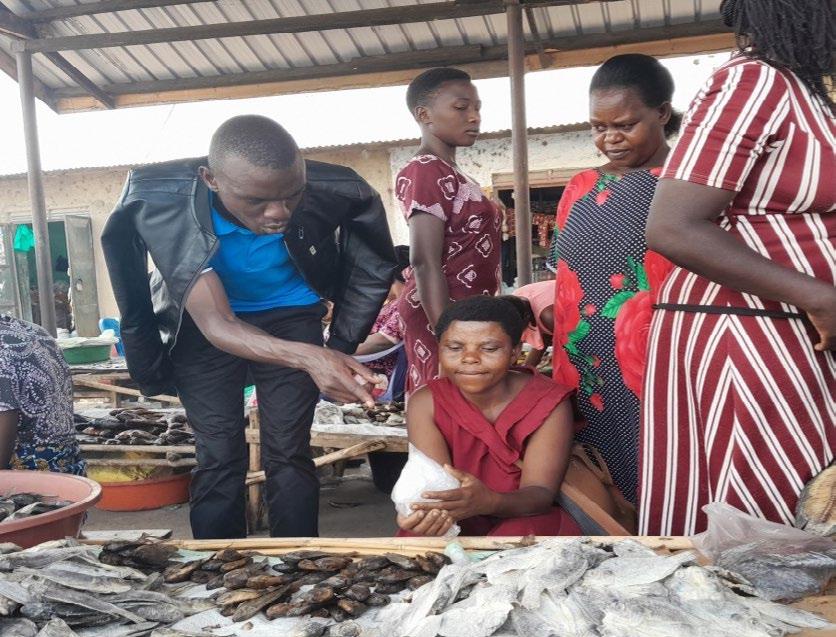
Wellos, on the left of the picture with his brother Christopher, is a member of the program in Chazimi in central Malawi. Since he joined in 2020, he has launched several successful businesses including his own grocery store and mechanics workshop, which have helped to triple their household income in a year.


TEACHING
each household how to start and manage their own food garden, training them in good farming practices and providing them with seeds and fertilizer.

PROVIDING
households with vaccinated livestock, such as pigs and goats, and teaching them how to best care for and benefit from them.



“We feel happy now because our community supports us. They come and buy from our shop, and send people to visit us.”
Run in conjunction, the four program pillars ensure the households can generate a safe and regular income and they have a support network to protect and promote their welfare.
The guardians help all of the children in a household to feel less isolated and lonely, and they encourage, motivate and represent them in their community. Alongside the head of the household, the guardians receive training in agriculture and livestock rearing so that they can offer practical advice and solutions, helping to develop their food garden and animals into valuable assets, and support them in the running of their small businesses.
On the right: An agricultural skills training session for 40 guardians in Ngodzi, central Malawi.

100% of the new households we worked with in 2022 were introduced to a guardian, who was given training on how to support them.
Establishing a small business enables households to quickly afford necessities, such as food and medicine, and instantly improve their standard of living. With the support and guidance of their guardian and our partners, households grow their businesses over time to become more and more profitable, giving them more income to invest in their futures. They often use their new skills to launch other ventures and further diversify their livelihood.

On the left:
100% of households we worked with in 2022 were running a business, with 51% of them choosing to sell groceries.
Fiona (left), a member of the program in the Oyam District in northern Uganda, with her new business buying and selling groceries. 2022 HIGHLIGHT 2022 HIGHLIGHTUpon joining the program, households begin training in a variety of agriculture skills, such as irrigation and crop rotation, and learn to make their own natural fertilizer using manure from their livestock. They typically grow a range of nutritious food, including maize, pumpkins, sweet potatoes, rice and groundnuts. Their garden not only provides them with a consistent supply of fresh food, but also surplus that can be sold for additional income.
On the right: Joan (left) from Kisege in western Uganda, with her siblings and their guardian Rachel, had a bumper aubergine harvest last year.

2022 HIGHLIGHT
2022 was the most successful year for households since the start of the program. In total, they earned over $1,500 in profit from their food gardens.
53 animals were given to households throughout the year and 249 offspring were born as a result.
Livestock can be a transformative asset for a child headed household. They provide a source of nutrition that can improve their food security as well as manure that can benefit their garden. They are also an essential economic safety net. As they produce offspring and their numbers grow, households can sell their animals often for a high price. During challenging times, this can be a useful stop gap and provide a quick boost to a household’s income.
On the left: Christopher (right) and two of his siblings pictured with a goat that they received through the program in Nkhwidzi, Malawi.
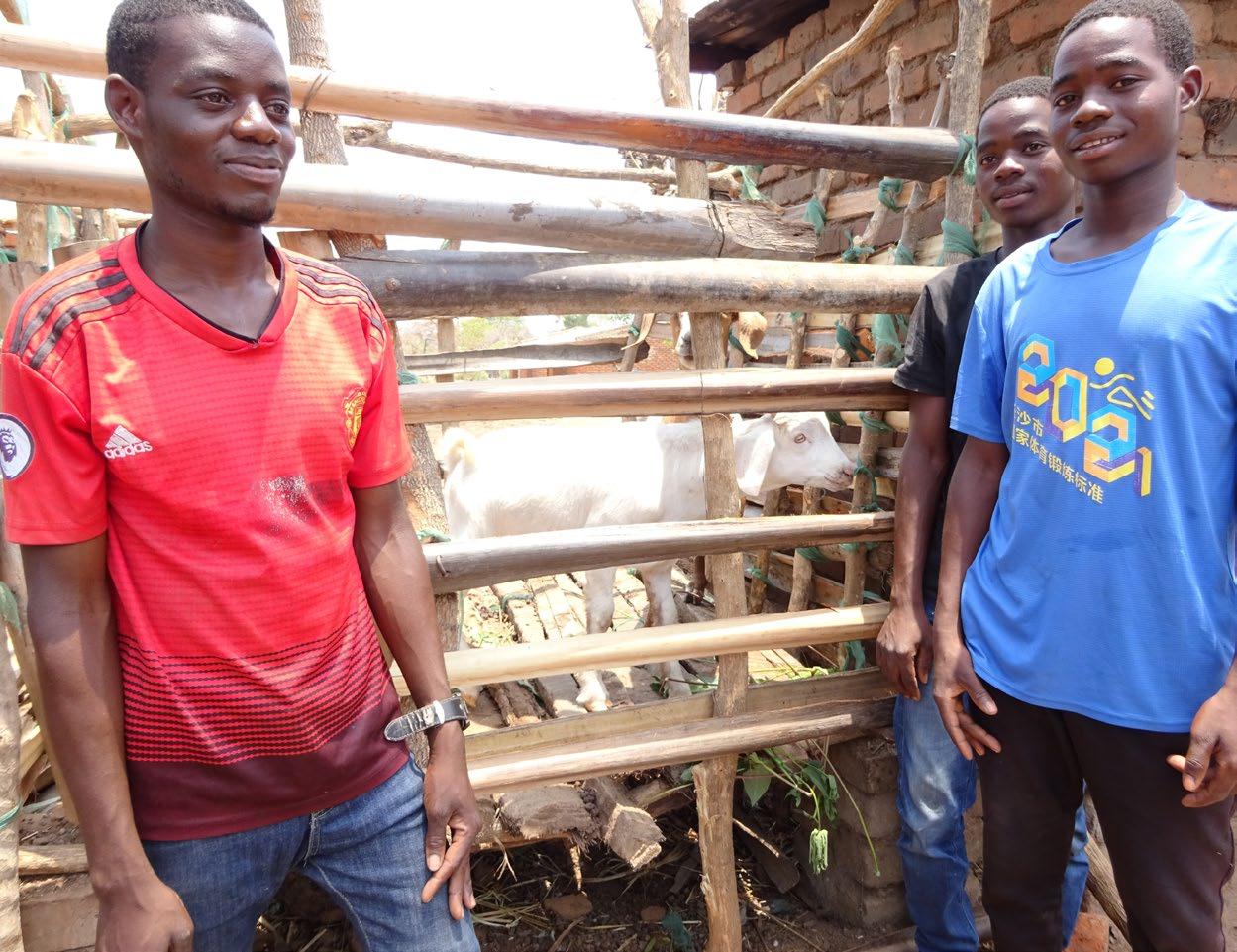






Through the program, child headed households become more resilient, ensuring they have a platform from which to thrive and skills to fall back on during challenging times. The many impacts include:
Guardians support and protect the households, reducing their vulnerability to abuse and exploitation. Girls in particular are less at risk of child marriage and early pregnancy.
As they start to earn income from their small businesses and their gardens develop, households eat a wider variety of food and can afford items such as soap and detergent.
With a more reliable income, the children can afford to pay school fees and cover costs such as uniforms and books. They are less likely to miss school in order to search for food or money.
With the increase in income from their small businesses, the children can buy clothes, shoes, bedding and other basic necessities, which instantly improves their standard of living and wellbeing.
The households are able to afford building materials such as bricks and steel roofs that vastly improve their homes. Some even choose to build new homes and invest in solar panels to access electricity.
As they learn new skills and feel more supported, the children open up about their lives and become empowered with the extra support, helping them to feel happier and more fulfilled.
Across the three years of the program, the heads of households develop a wide range of new skills that can help them to find new employment or grow their existing businesses further.
The guardians work with the households’ to improve their standing in their wider community, strengthening their support network as well as their customer base for their business.



With their day-to-day needs better taken care of and with better access to education and learning, households can begin to look ahead and work towards achieving their life goals.
George, a member of the program in Salima, central Malawi. Since he joined in 2020, he has developed several successful businesses that have enabled him to build his own home and even install a solar panel as a source of electricity, which he is pictured with on the left.
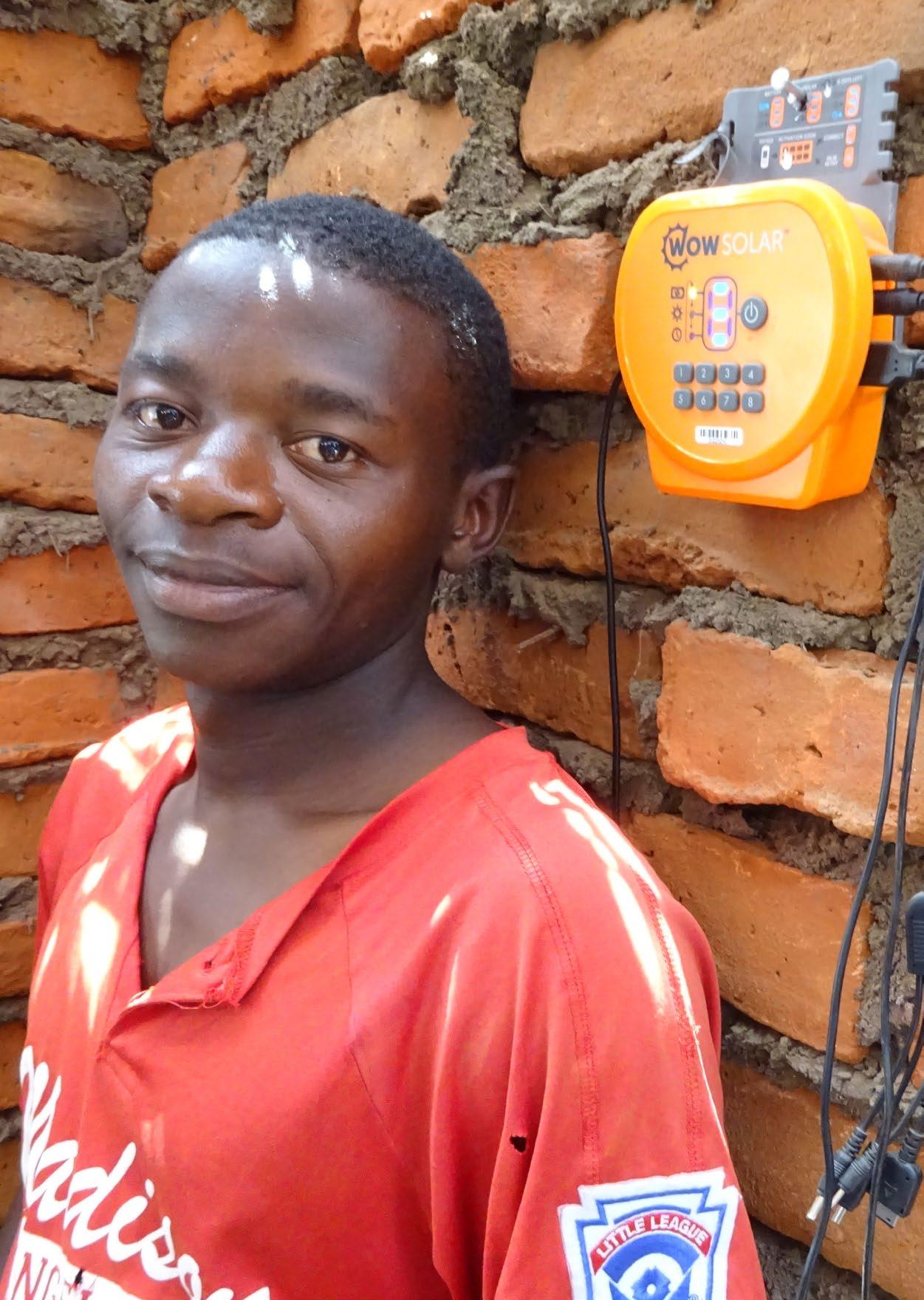
“I have learnt to be happy and not underestimate myself. Now I know I have the potential to do anything.”
In 2022, thanks to your support, we worked with 127 households in Malawi and Uganda, reaching 445 vulnerable children.
NEW HOUSEHOLDS
60 new households were introduced to the program across the year.
100% of the new households now have a trained guardian caring for them.
$133
219 children were reached as a result, an average of four children per household.
100% of the new households are now running a food garden.
15
was the average age of the head of the household, ranging from 10 to 21.
33%

of the new households have already set up a livestock project, an activity which usually takes place in the second and third years of the program.
was the average amount earned by each new household in 2022, a big increase as many previously had no income at all.
We asked the 60 new households: “What are the three biggest changes you have seen in your life since joining the program?”
The chart on the right determines the % for each response e.g. 24% of responses stated that one of the biggest changes has been better access to education.
85%
of the schoolaged children are back in education compared to 50% at the beginning of the program.
67 households continued with the program into their second and third years.
100% of the existing households have a trained guardian caring for them.
600% was the average increase in income for the 27 households in the third year of the program over the last three years, as seen on the chart on the right.
The top three changes reported by these households after three years in the program were improved food security, access to vocational training and education.
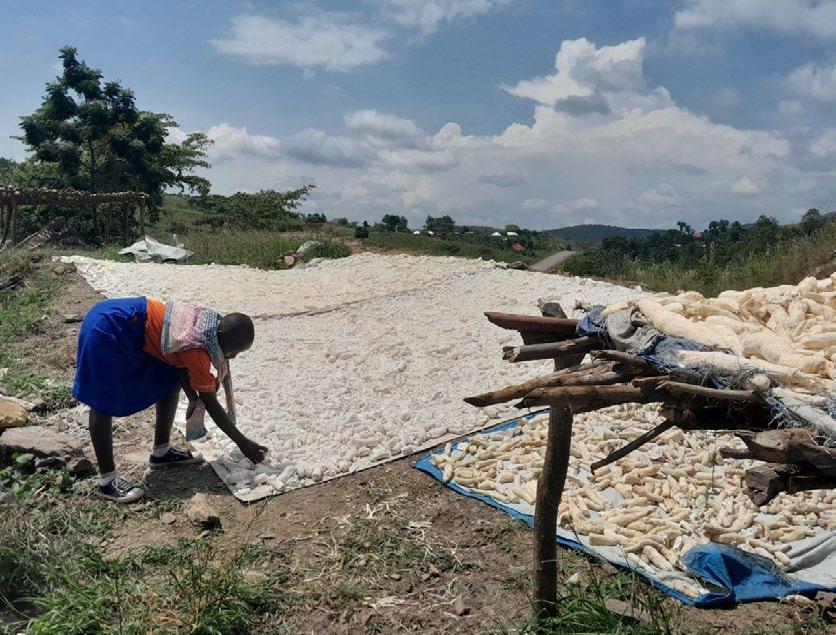
226 children continued to be supported as a result, an average of three children per household.

100% of the existing households are running a food garden.

17 was the average age of the head of the household, ranging from 8 to 22.
96% of the households in the third and final year are managing their own livestock project.
$44,445
was invested by WeSeeHope in the running of the CHH Program in 2022, covering all training, support and equipment. This was used to fund:
for three Child Headed Household Officers who deliver all training, ongoing support and monitoring to the households.
for the households, including:
• Garden inputs such as watering cans, hoes, fertilizer and seeds for the 60 new households.
• Start-up business materials for the 60 new households.
• Two vaccinated goats or pigs for the 40 households in the second year of the program, as well as materials to build animal enclosures.
• Construction or repairs for nine households in Malawi and four households in Uganda who were previously living in damaged or unsuitable homes.


delivered to all households, including:
• Workshops for the 60 new guardians, covering topics such as business monitoring, crop and animal management, documentation and record keeping, and counselling and guidance.
• Sessions for the 60 new household heads, teaching them business skills, marketing and record keeping, as well as crop management and animal husbandry.
for 25 household heads in the likes of tailoring and mechanics, including tool kits and start-up materials to launch a new vocational business after completing their course.

THE PROGRAM TO DATE [2018 - 2022]
225 child headed households have been introduced to the program since we launched it in 2018.
100% of the households have a trained guardian caring for them and are running their own food garden.
839 of the most vulnerable and isolated children have been reached as a result.
$56,446 has been generated by all of the households, with their average annual income increasing from $99 after one year, to $268 after three.
16 is the average age of the head of the household and there an average of four children per household.
89% of the school-aged children in the households are back in education compared to 58% at the beginning of the program.
Tom, CHH Officer for one of our Ugandan partners, RIDE, with three members of the program, Joan, Shawin and Charles. Tom visits each household every week to check in on their progress and offer support and guidance.

“The businesses are increasing income and are supporting households to pay school fees, scholastic materials and bedding”.
Asiatu lives in Nkhwidzi, a rural community in the Salima District along with her four siblings, Patrick, Loyd, Boniface and Jennifer, and their grandfather.
Following the loss of her parents when she was just 13, Asiatu became responsible for providing and caring for her family. But with limited opportunities to find work, and without the skills or tools, she struggled to earn enough money to keep up with their needs. This continued for two years.
In 2019, when Asiatu was 15, we began running the Child Headed Households Program in her community with our partner in the region, MPC Nkhoma, and she was quickly identified to join.
First, the family were paired with a trained guardian, Awele, and she and Asiatu took part in agriculture skills training. They planted crops on land
Asiatu had inherited from her parents, and have since grown a wide variety of crops including maize groundnuts, lentils and soybeans, to feed the family.
Second, having learnt tailoring skills on our Vocational Training Program, Asiatu was supported to launch her own business making and repairing clothes.

Most days she now earns up to 4,000 MWK ($3.80) from this business and has invested some of her earnings in a new plate-selling business. Purchasing large quantities of plates at wholesale prices, she then sells them on to households in surrounding areas for a profit.
Third, Asiatu was given a pair of goats - one male and one female - which have
“MY SIBLINGS HAVE BEEN GOING TO SCHOOL WITH HOPE.”
ASIATU, A MEMBER OF THE CHH PROGRAM IN MALAWI
produced two offspring. With Awele’s support, she has sold one for 30,000 MWK ($28), and kept the other to grow her livestock project.

In the first year of the program, Asiatu earned $79. At the end of the second year, this increased to $334. By her third year, she earned an astonishing $899.
“I have learnt to manage the money I make on a daily basis to avoid over expenditure and ensure my businesses can continue,” she explained.
$899
For context, this is in a country where the average annual income is $600$700 and in an area where families are often earning much less than this.
Asiatu is now not only able to take care of her family’s daily needs, but she has also started the construction of a new house. She pays for her sibling’s school fees and is taking evening classes so that she can complete her secondary education.
She explained, “my siblings have been going to school with hope due to the influence of our guardian, the support we have, and the availability of food at home.”

Due to their immense vulnerability, it is essential that child headed households are provided with intense support and guidance over the three years of the program. Since we launched it in 2018, we have refined how this is done in order to have the greatest impact.
Each household has their own guardians who is responsible for:
• Visiting the households regularly to check-in and monitor how they are doing.
• Providing practical support with their homes, businesses, gardens and livestock projects.
Each of our partners who run the program have a full-time Child Headed Household Officers, whose responsibilities include:
• Providing the households with initial and then ongoing training and support.
• Carrying out regular visits to the households to monitor their progress, (weekly for households in the first year and monthly for households in the second and final year).
• Collecting data, including the income generated by each of their businesses, food gardens and livestock, from each household.
• Submitting six-month and annual narrative and financial reports to WeSeeHope, as well as data for our analysis at the end of the program year.
In order to evaluate the growth, successes and challenges of the program, the WeSeeHope team are responsible for:
• Providing day-to-day technical support and capacity building to each of our partners who run the program.
• Visiting each of them twice a year to monitor and evaluate the activities and outcomes related to the CHH Program, observing the households, assessing whether they are functioning well, and hearing feedback from them.
• Validating and verifying the stated impacts on the lives of vulnerable children.
• Operating a database where all information about each household is centralised and analyzed.

Together with Qlik.org, the corporate responsibility arm of leading data analytics company Qlik and long-term WeSeeHope partner, we are in the process of developing a data dashboard for the CHH Program. This will:


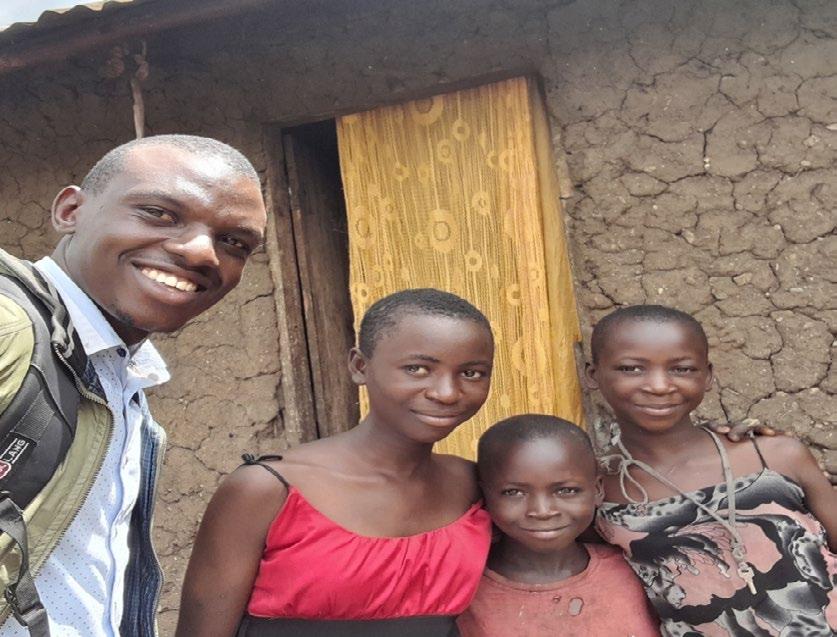
• Analyze the economic and social data collected from every household until the moment they can operate independently of our support.
• Advance how we are able to monitor and evaluate the running and impact of the program in “real-time”.
• Enable us to tackle any challenges, enhance our decision-making and demonstrate the impact of your support.
We look forward to sharing this later in 2023!


